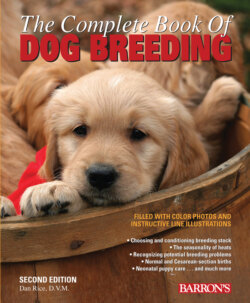Читать книгу The Complete Book of Dog Breeding - Dan Rice - Страница 48
На сайте Литреса книга снята с продажи.
Health and Immune Status
ОглавлениеConditioning a breeding animal is not complete without consideration of its general health and vaccination history. Before your brood bitch is due to come into heat, or upon the first signs of proestrus vaginal bleeding, schedule a visit to your veterinarian. A physical examination is an excellent investment prior to breeding (see Pre-breeding Evaluation, page 44). Even in proven brood bitches that have been bred and produced puppies previously, an examination is recommended. Your health care professional may detect something minor such as an ear infection or dental problem that needs correction before the stress of breeding and pregnancy begins.
The examination will affirm your dog’s nutritional and general health status, and recommendations may be made about exercise or dietary changes. A fecal (stool) sample will probably be requested to determine if she has intestinal parasites. If the test is positive, treatment will be arranged to relieve the stress of the parasites and minimize their passage to the puppies.
Heartworm protection will be discussed and recommendations about the best prevention techniques that are compatible with breeding animals.
Your veterinarian will update you on anything new on the immunization scene. He or she will probably recommend vaccinations for your bitch to assure that the highest possible immunity and disease protection will be passed to the puppies.
In the rapidly advancing animal biological and pharmaceutical industries, new products and techniques enter the arena regularly. It is not appropriate to list each parasite and its treatment in this book or to advise you about which vaccines should be administered to your brood bitch. Some diseases are prevalent in one part of the country and virtually absent in others. Biologicals that were appropriately administered to a breeding animal last year may be less effective than new vaccines that just emerged from the laboratories (see Some Diseases Preventable by Vaccinations, page 160).
Even if you treat your dogs for parasites at home, it is important to use the best products and to have the latest information. Update your knowledge through a consultation with your veterinarian, even if it is only a phone call. Ask about newer flea and tick control methods, including systemic products and yard treatments. Don’t spend your time and money on gimmicks, insecticide baths, repellent collars, or electronic devices, all of which may or may not work for you. Inquire about vermifuges (worm medications) that are safe to use during breeding, gestation, and lactation. A number of chemicals are contraindicated during bitches’ reproductive phases.
It is unlikely you will see the most up-to-date information in your daily newspaper. Advertisements and package inserts are easily misinterpreted or misleading. Place your trust in information from professionals whose business it is to stay currently informed.
